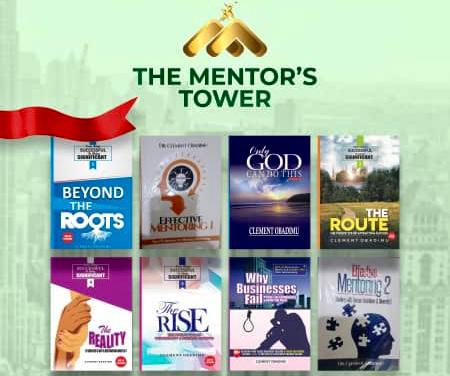All-in-one Mentorship Course
Categories: mentortower1

Course Content
EMS 3011 – Mentorship: Rewards and Benefits
Mentor: one who sees beyond the facade, the dross, and pretexts to excavate the gems buried in the mentee knowing that beyond just his own prejudice; beyond the mentee’s blind submission there’s a reward for the sacrifice, there’
-
Reward & Benefits
-
Rewards and Benefits of Mentorship
EMS 3021 – Mentors’ Diversity
Part 1: MENTOR’S DIVERSITY - CATEGORIES
1. Sagacious Mentor
2. Buddy Mentor
3. Shadow Mentor
4. Cryptic Mentor
5. Special Mentor
6. Yourself – Personal responsibility
7. Villain Mentor
Part 2: MENTOR’S DIVERSITY 2 - TYPES
8. Traditional Mentor
9. Reverse Mentor
10. Peer Mentor
11. Aspirational Mentor
12. Practical Mentor
13. Coping Mentor
-
Sagacious Mentor
-
Buddy Mentor
-
Shadow Mentor
-
Cryptic Mentor
-
Special Mentor
-
Yourself – Personal responsibility
-
Villain Mentor
-
Traditional Mentor
-
Reverse Mentor
-
Peer Mentor
-
Aspirational Mentor
-
Practical Mentor
-
Coping Mentor
-
Mentors’ Diversity
EMS 3051 – Mentoring: The Unseen Struggle
-
Introduction
-
Environment & Culture
-
Level of confidence & risk tolerance
-
History
-
Physical Needs
-
Personal Stakes
-
Perspective
-
Mentor’s attributes
-
Lack of Commitment
-
Unfair Manipulation on the part of the Mentor/Mentee
-
Resentment or Jealousy from Others
-
Anxiety & Depression
-
Conflict of Interest
-
The Unseen Struggle in Mentoring
EMS 3032 – Mindset for Effective Mentoring – II: The Mentee
-
Always be Ready to Learn (Be Teachable
-
Be Inquisitive (Ask Questions):
-
Be Goal Orientated
-
Be Time Conscious (Time Management)
-
Be Respectful
-
Be Committed
-
Be Confident
-
Be Committed
-
Be Open-Minded and Non-judgmental
-
Be Appreciative of Criticisms
-
Mindset for Effective Mentoring – II: The Mentee
EMS 3033 Mindset for Effective Mentoring – III: Society
-
Introduction
-
Even good things can come out of Bethlehem mindset
-
Right peg mindset
-
Reversing the blame culture
-
Catching up with new age mindset –
-
Gender mindset
-
Environment / Culture mindset
-
Follow the multitude mindset / Identity crisis
-
Society’s Role in Shaping Effective Mentoring
GFS 114–NEGOTIATION
-
Introduction
-
Do’s and Don’ts of A Negotiation
-
Before, During and After a Negotiation
-
Effective Negotiation: Do’s & Don’ts
GFS 116–Nature – Reality in Diversity
“But ask the animals, and they will teach you, or the birds in the sky and they will tell you; or speak to the earth, and it will teach you, or let the fish in the sea inform you. Which of all these does not know that the
hand of the LORD has done this? In his hand is the life of every creature and the breath of all mankind. Scripture: Job 12: 7 -10
-
The Hardworking and Wise Ants
-
The Honey Comb
-
Mountains
-
Animals in diversity
-
The skin shedding Snakes
-
The flocking Birds
-
The Metamorphosing Butterflies
-
The unseen Wind
-
The Adapting Chameleon: Acceptance of change
-
The Dove & Sheep teach us to be as peaceful humble and as gentle as we can be
-
Nature teaches divine timing
-
Beauty in Simplicity Peacock
-
Natural Disasters
-
Eagle: Seven Attitudes that the eagle possesses
-
Nature: Reality in Diversity
EMS 3111– 30+ Mentoring Mistakes
-
Common Mistakes Mentors Make: Avoiding Pitfalls for Effective Mentorship
-
Identifying and Avoiding Common Mentoring Mistakes
GFS 113–Attitude and Temperament
-
Attitude & Temperament
-
Understanding the Impact of Attitude and Temperament
Perception in Mentorship: Understanding and Bridging Perspectives
What are you responsible to learn?
Explain how two people can see the same thing and interpret it differently.
List the three determinants of attribution.
Describe how shortcuts can assist in or distort our judgment of others.
Explain how perception affects the decision-making process.
Outline the six steps in the rational decision-making model.
Describe the actions of the boundedly rational decision maker.
List and explain eight (8) common decision biases or errors.
Identify the conditions in which individuals are most likely to use intuition in decision making.
Describe four styles of decision making.
Contrast the three ethical decision criteria
-
Perception and Individual Decision Making
-
Understanding and Bridging Perspectives
PSF 2011 – Overcoming Nervousness, Apprehension, Anxiety, and Fear in Public Speaking
-
Overcoming Nervousness, Apprehension, Anxiety, and Fear in Public Speaking
-
Addressing Public Speaking Challenges Through Mentoring
PSF – Components of a Successful Speech
-
Components of a Successful Speech
-
Analyzing the Components of a Successful Speech
EMS 3071 – Learning Theories in Mentoring
-
Learning Theories in Mentoring
-
Applying Learning Theories in Mentoring
GFS 107 – Strategic Thinking-2 – a Lesson from Creatures
-
Strategic Thinking-2 – a Lesson from Creatures
-
Learning Strategic Thinking from Nature
GFS 106 – Strategic Thinking-1 & Problem Solving
-
Problem-Solving Skills for Mentors: Navigating Challenges with Confidence
-
Enhancing Strategic Thinking and Problem-Solving Skills
EMS 3031 – Mindset for Effective Mentoring – I: Mentor
-
Mindset Mastery: Optimizing Your Approach as a Mentor
-
Developing the Mindset for Effective Mentoring as a Mentor
EMS 3001 – Mentoring: Introduction, Effectiveness & Styles
-
Mentor Etiquette and Professional Mannerisms: Building Respectful Relationships
-
Understanding Mentoring: Introduction, Effectiveness, and Styles
EMS 3032 – Mindset for Effective Mentoring – II: The Mentee
-
Mindset for Effective Mentoring – II
-
Developing the Mentee’s Mindset for Effective Mentoring
EMS 3061 – Psychology of Mentoring
-
Psychology in Mentoring: The 5-Application of Psychological Theories
-
Applying the 5 Psychological Theories in Mentoring
Student Ratings & Reviews

No Review Yet
- Login
- Sign Up
body::-webkit-scrollbar {
width: 7px;
}
body::-webkit-scrollbar-track {
border-radius: 10px;
background: #f0f0f0;
}
body::-webkit-scrollbar-thumb {
border-radius: 50px;
background: #dfdbdb
}
